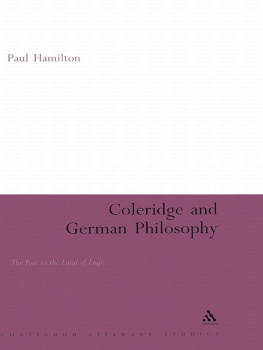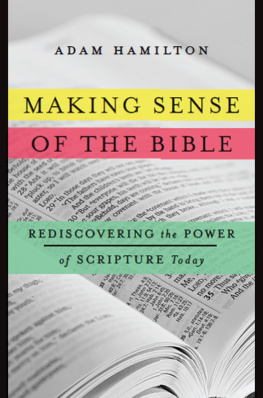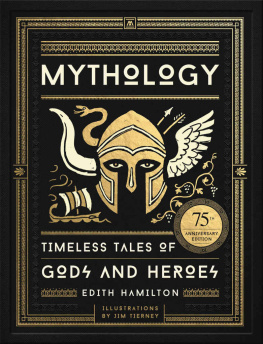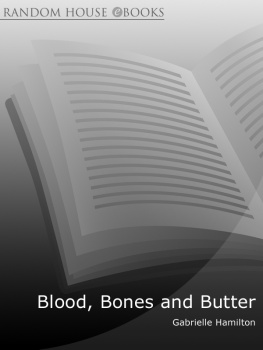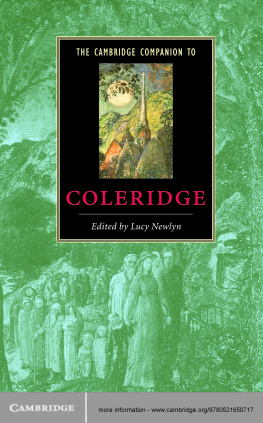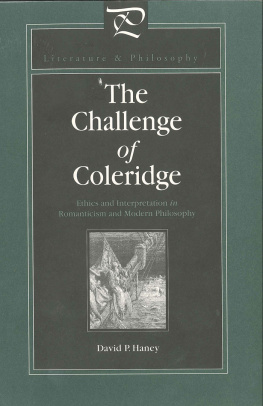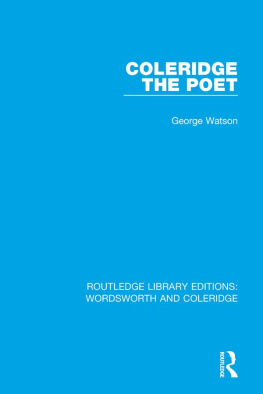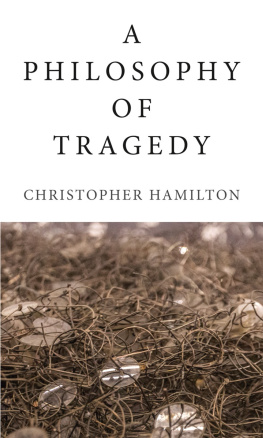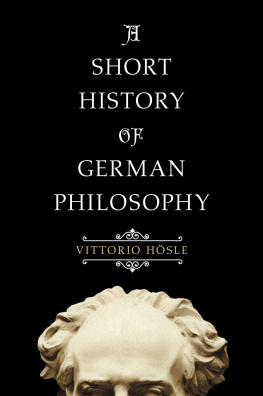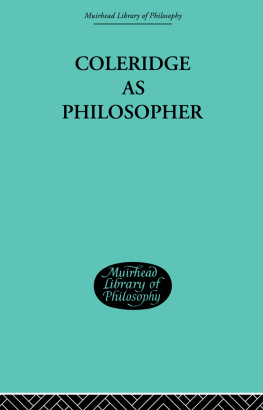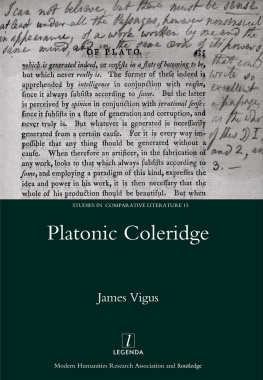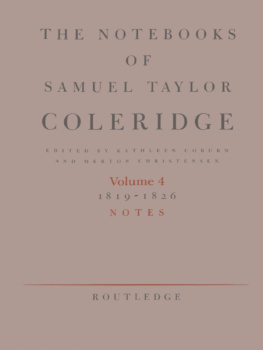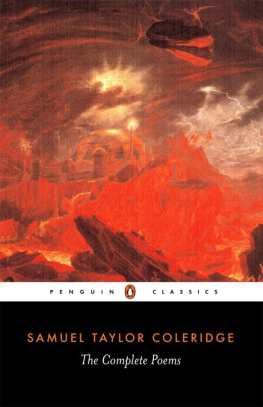Hamilton - Coleridge and German Philosophy
Here you can read online Hamilton - Coleridge and German Philosophy full text of the book (entire story) in english for free. Download pdf and epub, get meaning, cover and reviews about this ebook. year: 2011, publisher: Bloomsbury Publishing, genre: Religion. Description of the work, (preface) as well as reviews are available. Best literature library LitArk.com created for fans of good reading and offers a wide selection of genres:
Romance novel
Science fiction
Adventure
Detective
Science
History
Home and family
Prose
Art
Politics
Computer
Non-fiction
Religion
Business
Children
Humor
Choose a favorite category and find really read worthwhile books. Enjoy immersion in the world of imagination, feel the emotions of the characters or learn something new for yourself, make an fascinating discovery.
Coleridge and German Philosophy: summary, description and annotation
We offer to read an annotation, description, summary or preface (depends on what the author of the book "Coleridge and German Philosophy" wrote himself). If you haven't found the necessary information about the book — write in the comments, we will try to find it.
Coleridge and German Philosophy — read online for free the complete book (whole text) full work
Below is the text of the book, divided by pages. System saving the place of the last page read, allows you to conveniently read the book "Coleridge and German Philosophy" online for free, without having to search again every time where you left off. Put a bookmark, and you can go to the page where you finished reading at any time.
Font size:
Interval:
Bookmark:
Coleridge and German Philosophy
Paul Hamilton

Continuum
The Tower Building | 80 Maiden Lane, Suite 704 |
11 York Road | New York |
London SEI 7NX | NY 10038 |
Paul Hamilton 2007
All rights reserved. No part of this publication may be reproduced or transmitted in any form or by any means, electronic or mechanical, including photocopying, recording, or any information storage or retrieval system, without prior permission in writing from the publishers.
Paul Hamilton has asserted his right under the Copyright, Designs and Patents Act, 1988, to be identified as Author of this work.
British Library Cataloguing-in-Publication Data
A catalogue record for this book is available from the British Library.
ISBN-10: | 0-8264-9543-5 |
ISBN-13: | 978-0-8264-9543-3 |
Library of Congress Cataloging-in-Pubhcation Data
A catalog record for this book is available from the Library of Congress.
Aids | Aids to Reflection, edited by John Beer, CC9 (1993) |
BL | Biographia Literaria, edited by James Engell and W. Jackson Bate, 2 vols, CC7 (1985) |
CC | The Collected Works of Samuel Taylor Coleridge, general editor Kathleen Coburn, Bollingen Series, 16 vols (Princeton University Press, 1971-2001). Individual volumes in the edition are given separate entries. |
CL | The Collected Letters of Samuel Taylor Coleridge, edited by Earl Leslie Griggs, 6 vols. (Oxford: Oxford University Press, 1956-71) |
CM | Marginalia, edited by Heather Jackson and George Whalley, 6 parts, CC 12 (1980-2001) |
CN | The Notebooks of Samuel Taylor Coleridge, ed. Kathleen Coburn, 5 vols. Vol. 4 edited by Kathleen Coburn and Merton Christensen; Vol. 5 edited by Kathleen Coburn and Anthony John Harding. Each vol. is in two parts, text and notes (London: Routledge and Kegan Paul, 1957-2002) |
Lay Sermons, edited by Reginald James White, CC6 (1972) | |
PhL | Lectures 1818-1819: On the History of Philosophy, edited by J.R. de J. Jackson, 2 vols, CC8 (2000) |
Logic | Logic, edited by James Robert de Jager Jackson, CC 13 (1981) |
OM | Opus Maximum, edited by Thomas McFarland, CC 15 (2002) |
PW | Poetical Works: Part 3. Plays, edited by J.C.C. Mays and Joyce Crick, 2 vols, CC 16 (2001) |
SWF | Shorter Works and Fragments, edited by H.J.Jackson and J. R. de J.Jackson, 2 vols, CC 11 (1995) |
TT | Table Talk, edited by Kathleen Coburn and B. Winer, 2 vols, CC 14 (1990) |
The Friend | The Friend, edited by Barbara E. Rooke, 2 vols, CC4 (1969) |
Phenomenology | G.W.F. Hegel, Phenomenology of Spirit, translated by A.V. Miller, with an analysis of the text and foreword by J. H. Findlay (Oxford: Clarendon Press, 1977) |
Werke | G.W.F. Hegel, Werke, based on the edition of the Werke of 1832-45, newly edited version by Eva Moldenhauer and Karl Markus Michel, 21 vols (Frankfurt: Suhrkamp, 1970) |
Werke | I. Kant, Werke, edited by Wilhelm Weischedel, 12vols (Frankfurt am Main: Suhrkamp, 1977) |
System | F.WJ. Schelling, System of Transcendental Idealism, introduction by Michael Vater, translated by Peter Heath (Charlottesville: University of Virginia Press, 1978) |
Werke | F.WJ. Schelling, Smmtliche Werke, edited by K.W.F. Schelling, part I, vols 1-10, part II, vols 11-14 (Stuttgart: Cotta, 1856-61) |
I am very grateful to various people for ideas and help important to me that they probably were not aware of giving at the time, among them Andrew Bowie, Howard Caygill, Jim Chandler, Lilla Crisafulli, Michael Kooy, Peter Dews. At Queen Mary University of London I have been fortunate in working with a cohort of inspiring graduate students who have never let me stand still. Two current ones, Rowan Boyson and Molly Macdonald, kindly read and commented on parts of the draft.
This book is dedicated to the memory of my father, Patrick Hamilton (1916-2005), who encouraged me to delight in a shared philosophical passion a long, long time ago.
My Dream History of Scotus, deranged as a youth / imagining himself in the Land of Logic, lying on the Road & in the Road to the Kingdom of Truth, falls into a criminal Intercourse with a Girl, who is in Love with him, whom he considers as the Daughter of the King of the Land / impersonation & absolute Incarnation of the most Abstract -. Detected he defends himself on this ground. O it was a wild dream, yet a deal of true psychological Feeling at the bottom of it... (CN, I, 1824)
This book is about Coleridges informal philosophical adventures. Informal in the sense that their systematic presentation was never completed, and also in the sense that their psychological satisfactions are palpable and approachable not exclusive and remote. If we become familiar with the predominantly German philosophical idiom in which they appear, then their adventurousness merits the racy tale told in the Coleridgean epigraph above. As this cryptic, early Notebook entry suggests, the story of Coleridges philosophical connections was always going to be complicated and compromised. Spontaneously his intellectual biography assumes dramatic form, staged vicariously through the dream of another logician, Duns Scotus. The contemporary master-trope of philosophical dispute in Coleridges time was Pantheism. Truth, as Schellings major opponent in the revived quarrel over Pantheism, Jacobi, maintained, need not, perhaps should not, be gained philosophically. If that is so, then philosophy can be accused of a sort of intellectual dalliance, at best distracting from true seriousness, at worst a criminal pleasure. A defence of philosophical activity, though, lies in Scotus claim that such intercourse is in any case of such a degree of abstraction that its otherwise scandalous desire may actually coincide with an ultimate mission to understand the final things. After all, impersonation & absolute Incarnation describes accurately Schellings alternative to jacobis theology: a God of becoming, one whose self-production in shapes proportionate to human faculties of apprehension is what renders him a personal God, in line with the demands of Christian dogma.
I will frequently, however, try to avoid explaining Coleridges philosophical adventures by attributing to him a partisan position within the repeatedly Instead, I will concentrate on the eroticism of Coleridges philosophical engagements, if you like; the sheer overwhelming pleasure the man obviously took in surfing the waves of German idealism and post-Kantianism that followed each other in close succession. A book taking this approach is not going to be zealous in uncovering exact sources, preferring to look for the amplification by each other of Coleridgean and German philosophical views and ideas. Coleridges sympathies and antipathies towards certain philosophical positions are not always extricable from each other, as the guilty entanglement above suggests.
Next pageFont size:
Interval:
Bookmark:
Similar books «Coleridge and German Philosophy»
Look at similar books to Coleridge and German Philosophy. We have selected literature similar in name and meaning in the hope of providing readers with more options to find new, interesting, not yet read works.
Discussion, reviews of the book Coleridge and German Philosophy and just readers' own opinions. Leave your comments, write what you think about the work, its meaning or the main characters. Specify what exactly you liked and what you didn't like, and why you think so.

